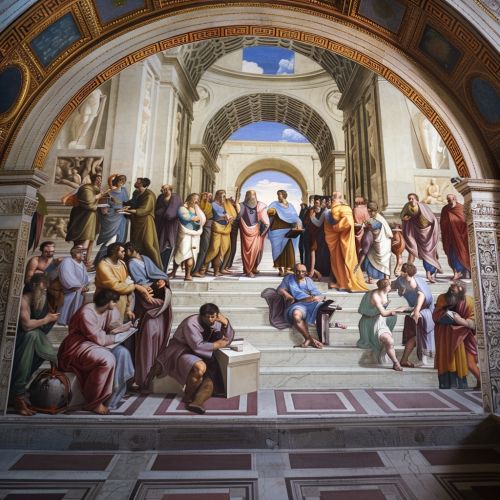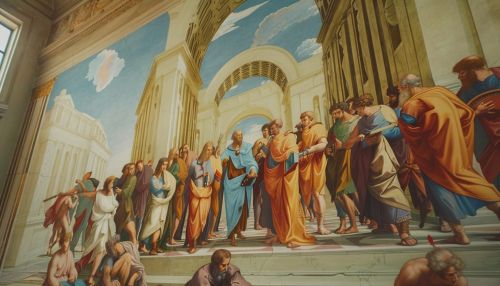The Republic
Introduction
The Republic is a Socratic dialogue written by the ancient Greek philosopher Plato. It is one of his most well-known works and is considered a cornerstone of Western philosophy and political theory. The dialogue is set in a fictional conversation between Socrates and various other characters, including Glaucon, Adeimantus, and Thrasymachus. The central theme of The Republic is the question of justice and the ideal structure of a just society.
Structure of the Dialogue
The Republic is divided into ten books, each addressing different aspects of the central themes. The dialogue begins with a discussion on the nature of justice and progresses to the construction of an ideal city-state, the role of the philosopher-king, and the theory of forms.
Book I: The Nature of Justice
In Book I, Socrates engages in a debate with Thrasymachus, who argues that justice is nothing more than the advantage of the stronger. Socrates refutes this claim by demonstrating that rulers can make mistakes and that true justice benefits everyone in the society.
Book II-IV: The Ideal City-State
Books II to IV focus on the construction of an ideal city-state, known as Kallipolis. Socrates, along with Glaucon and Adeimantus, outlines the three classes of citizens: the producers, the auxiliaries, and the guardians. The guardians are further divided into rulers and soldiers. The concept of the "noble lie" is introduced to maintain social harmony and justify the class structure.
Book V-VII: The Philosopher-King
Books V to VII discuss the role of the philosopher-king, who is the ideal ruler of the city-state. Socrates argues that only philosophers, who have knowledge of the forms and the ultimate good, are fit to rule. The famous allegory of the cave is presented to illustrate the philosopher's journey from ignorance to knowledge.
Book VIII-IX: The Decline of the City-State
Books VIII and IX examine the decline of the ideal city-state through various forms of government: timocracy, oligarchy, democracy, and tyranny. Each form is shown to be increasingly unjust and unstable compared to the ideal.
Book X: The Immortality of the Soul
In Book X, Socrates concludes with a discussion on the immortality of the soul and the rewards of justice in the afterlife. The myth of Er is presented as an allegory for the soul's journey after death.
Philosophical Themes
The Republic addresses several key philosophical themes, including justice, the nature of the soul, the theory of forms, and the role of education.
Justice
Justice is the central theme of The Republic. Socrates seeks to define justice both in the individual and in the city-state. He argues that justice is a harmonious structure where each part performs its appropriate role.
The Soul
Socrates presents a tripartite theory of the soul, dividing it into three parts: the rational, the spirited, and the appetitive. Each part corresponds to a class in the city-state and must be balanced for the individual to be just.
Theory of Forms
The theory of forms is a key metaphysical concept in The Republic. Socrates argues that the forms are eternal and unchanging ideals that exist independently of the physical world. The form of the good is the highest form and the source of all other forms.
Education
Education is crucial in The Republic for the development of the philosopher-king and the maintenance of the ideal city-state. Socrates outlines a rigorous educational program that includes physical training, music, mathematics, and dialectic.


Political Theory
The Republic is also a foundational text in political theory, offering insights into the nature of governance, the role of the state, and the relationship between the individual and the community.
The Ideal State
The ideal state, or Kallipolis, is structured around the principle of specialization, where each class performs its designated role. The rulers govern with wisdom, the soldiers protect with courage, and the producers provide for the material needs of the society.
The Philosopher-King
The concept of the philosopher-king is central to Plato's political theory. Socrates argues that only those who have attained knowledge of the forms and the good are fit to rule. This idea challenges the notion of democracy and suggests that governance should be based on knowledge rather than popular opinion.
Critique of Democracy
Plato is critical of democracy, viewing it as a flawed system that leads to the rise of demagogues and the eventual descent into tyranny. He argues that democracy prioritizes individual freedom over the common good, resulting in social disorder and injustice.
Influence and Legacy
The Republic has had a profound influence on Western philosophy, political theory, and education. Its ideas have been debated, critiqued, and built upon by countless philosophers and thinkers throughout history.
Influence on Philosophy
Plato's ideas on justice, the soul, and the forms have shaped the course of Western philosophy. His work has influenced philosophers such as Aristotle, Immanuel Kant, and Georg Wilhelm Friedrich Hegel.
Influence on Political Theory
The Republic has also had a significant impact on political theory. Concepts such as the philosopher-king and the critique of democracy have been explored by political theorists and have influenced the development of political systems and ideologies.
Influence on Education
Plato's emphasis on education and the development of the philosopher-king has had a lasting impact on educational theory. His ideas on the importance of a well-rounded education that includes physical training, music, and philosophy continue to be relevant in contemporary educational practices.
